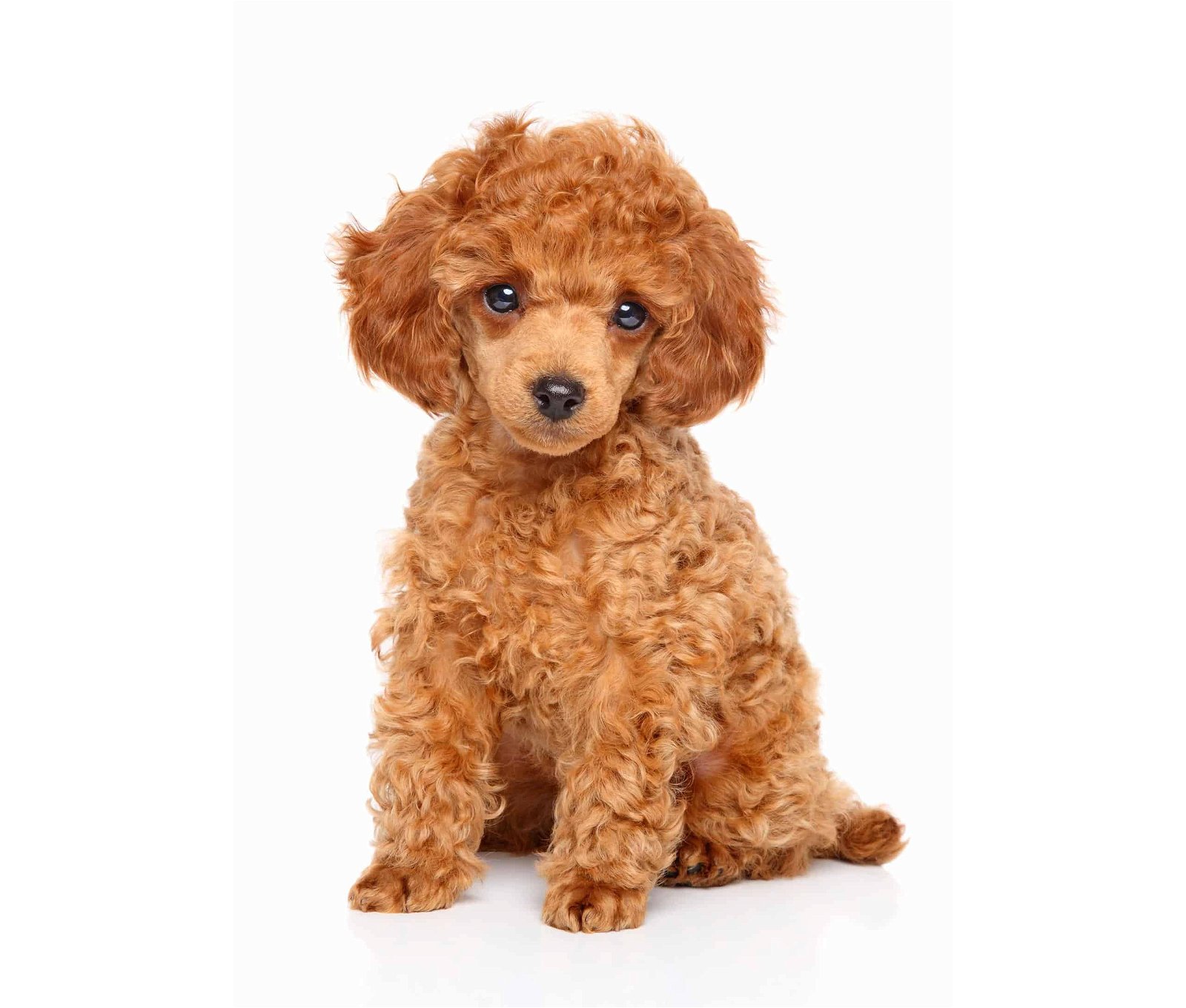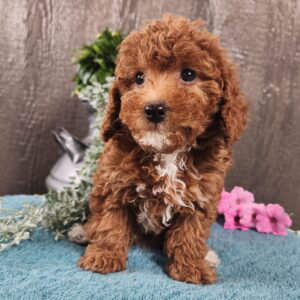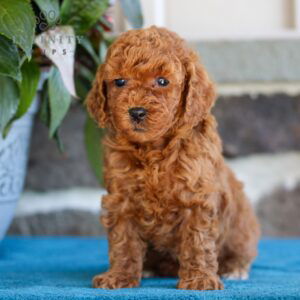Have a question about our Toy Poodle puppies?
"*" indicates required fields
overview of the Toy Poodle Dog Breed
Does your family need a low-shed, allergen-friendly dog that’s easy to train and loves people and other pets?
Take a look at our Toy Poodle puppies for sale below!
Toy poodles are less than 10 inches tall and weigh 4-6 pounds – perfect for small houses or apartments! They are intelligent, easy to house train, and loving – it’s even said that poodles can read their owner’s emotions!
Many people think of the elaborate, pom-pom like haircut (called the “Continental Clip”) when they think of poodles. However, poodles can be given regular haircuts that follow the contour of their body (called a “Sporting Clip”).
Purchase your Toy poodle puppy today and experience the joy of a playful, intelligent, and low-shed companion!
You can also view our other Poodle breeds: Mini Poodles or Standard Poodles, or view all of our available dog breeds on our home breed page.
Toy Poodle temperament
Intelligent and trainable: Described as “wickedly smart” by akc.org, a poodle can learn an incredible amount of commands and is even known to outwit its owners. Such intelligence means it needs opportunities to use its mind – do not keep a Poodle in a kennel. They need to be part of the family and allowed to interact and work with humans. Poodles make excellent therapy and companion dogs.
Alertness: Poodles are often alert and watchful, making them effective watchdogs. They can be quick to alert their owners to anything unusual.
Versatile: Poodles are versatile dogs that can excel in various roles, from family companions to working dogs. They have been used as hunting dogs, service dogs, therapy dogs, and in dog sports like agility and obedience.
People Loving and Friendly: Poodles love adults, children, and other dogs. They will sound the alarm at strangers but will be friendly. Poodles must be socialized at a young age, or they can become nervous and timid. Be sure to supervise children playing with your Toy Poodle. Toy Poodles are very small and can easily be injured by a fall or rough play.
Allergen-Friendly: The Poodle sheds less than any other dog breed (except the Mexican Hairless dog!). Many people with allergies can tolerate a poodle. However, if you have allergies, it’s always best to talk to your doctor before bringing any pet home.
Lively and playful: Poodles love to be the center of attention. They are attentive to their owners and love walks or doing tricks. Poodles were bred for retrieving and swimming and are excellent at both.
The Ultimate Companion Dog: People-loving, easy to train, eager to please, and Hypo-allergenic – toy poodles make excellent companions for anyone! Poodles rank ninth in the breeds registered with AKC.
Poodles come in different sizes and colors, but these characteristics are generally applicable across the breed. Proper training, socialization, and care contribute to raising a well-behaved and happy Poodle.
Toy Poodle Breed history
Although Poodles are the national dog of France, they originated in Germany, where they were bred and used as retrieving water dogs. At that time, the Poodle’s showy haircut was practical – it allowed the poodle to move about easily while hunting while still protecting certain parts of its body, such as the paws, chest, and head.
With its elegance and intelligence, the poodle became a popular breed among the French nobles and in other parts of Europe. Because of their trainable, attention-loving nature and showy looks, poodles were often used in the circus. They have also been used for hunt truffles- underground mushrooms- with their long snouts.
The Standard Poodle was downsized to the Miniature Poodle. The Toy Poodle was first bred in America in the early 20th century. If they are well-bred, each breed is a replica of the other.
Today, the Miniature Poodle is the most popular Poodle size, and the three sizes together rank ninth in the breeds registered with AKC.
You can also find many delightful Poodle mixes, such as the Yorkie Poo and more!
Toy Poodle Average size
Toy poodles are less than 10 inches tall. A poodle taller than 10 inches is considered a Miniature Poodle, and poodles over 15 inches are classified as Standard Poodles.
Toy poodles weigh 4-6 pounds.
Average Toy Poodle lifespan
Toy Poodles usually live 10-18 years.
Toy Poodle body features
Poodles are known for their elegant, square form when standing. They have a long, narrow muzzle with dark eyes set far apart. Their ears are long and flat and hang close to the sides of their head.
Poodles are usually solid colored and can be black, blue, silver, gray, cream, apricot, red, white, brown, or café au lait.
grooming Your Toy Poodle Puppy
Many people think of the elaborate, pom-pom like haircut (called the “Continental Clip”) when they think of poodles. However, poodles can be given regular haircuts that follow the contour of their body (called a “Sporting Clip”).
Although Poodles are known for minimal shedding, their curly coats need some extra care. They need to be groomed every 4-6 weeks and brushed regularly, or their coat will become matted and tangled. You can take your Toy Poodle to the groomer or learn to give them a haircut by yourself.
Poodles can have weepy eyes that may stain the fur around their eye area. Use a warm, damp cloth and gently wipe your poodle’s eyes to prevent eye stains.
Your poodle will also need its teeth brushed nails trimmed regularly.
Keeping Your Toy Poodle Puppy Healthy
If they are well cared for, most poodles are healthy and can live 14-18 years.
Legg-Calve-Perthes and luxating patellas are orthopedic conditions that are common in Miniature and Toy breeds.
Two adrenal disorders, Addison’s disease, and Cushing’s syndrome can occur in poodles. These can both be treated with life-long medication and occasionally surgery.
Hypothyroidism- not enough thyroid hormones – is another condition in poodles that can be managed with medication.
Progressive retinal atrophy (PRA) is a genetic condition that leads to blindness, and poodles are susceptible to this condition.
Poodles can also be affected by Von Willebrand’s disease, a blood clotting disorder.
Here are the recommended tests from the National Breed Club, as noted on AKC.org:
- Hip Evaluation
- Ophthalmologist Evaluation
- PRA Optigen DNA Test
- Patella Evaluation
Like all dog breeds, they are susceptible to hip and elbow dysplasia, two of the most common health issues among dogs.
Hip and elbow dysplasia occurs when the leg or hip becomes weakened, and it can result in arthritis or potential lameness if not addressed.
One of the best ways to prevent this is by keeping your dog from too much running on hard surfaces, especially when they are puppies.
Typical Toy Poodle Allergens
Allergens are caused by dander, which is dead skin cells. Both animals and humans shed these skin cells. Dander is attached to the hair that dogs shed.
Poodles are one of the lowest shedding dog breeds and are considered hypo-allergenic. However, if you or someone in your home has allergies, please talk to your family physician before adopting a puppy.
- 1. Why are Poodles so popular?Poodles are one of the most popular dog breeds in the world! They earn this status because of their hypoallergenic coats, love of people, and mind-blowing intelligence, among other positive traits.
- 2. Do Poodles really not shed?Poodles have a reputation for being that dog breed that never sheds. Is that true? Well, like all dogs, Poodles do shed some. But they do not shed much, and they shed lightly all year round instead of having a heavy seasonal shedding. Plus, most of the hair they shed gets caught in their curly coats, so you aren’t likely to see it around your home. If you want a dog that won’t leave hair all over your couch, a Poodle is a wonderful choice!
- 3. Are Poodles nervous?Poodles have a tendency to become nervous and timid if they are not well socialized when they are young. Make sure your dog gets plenty of experience with strange people and dogs when she is a puppy so she gets a chance to polish her social skills!
- 4. What is the most popular size of Poodle?Miniature Poodles are the most popular size.
- 5. Are there differences in personality between the different sizes of Poodles?There are slight personality differences between the different sizes of Poodles. For example, some say that Standard Poodles are more energetic than Toys or Minis, but Toys and Minis tend to be more outgoing. However, all the sizes have the same general characteristics of the beloved Poodle breed and make great pets! Personality also varies between individual dogs.
- 6. Do Toy Poodles bark a lot?Yes, Toy Poodles tend to be vocal dogs. You may have to train them that it’s not acceptable to bark at everything they see.
- 7. Are Toy Poodles high-energy?Don’t be fooled by their small size! Toy Poodles were bred to be exact replicas of their larger counterparts, and they have plenty of energy and work drive. Even though they are little, your Toy Poodle will still need adequate exercise daily. Be sure to make him walk places and schedule a daily playtime.
- 8. Do Toys Poodles like to swim?Toy Poodles LOVE to swim if they are used to it. They were bred to be water retrievers and they love the water. However, like all new things, if your Poodle isn’t used to the water she may be a little nervous about it at first.
- 9. Are Toy Poodles hard to groom?Poodles have fluffy coats that will need regular brushing and trips to the groomer. How much maintenance they require depends on whether you choose to clip them short in a “sporting clip” or let their fluffy coats grow and give them a more showy clip.
- 10. Can I leave my Toy Poodle alone?Toy Poodles love to be with their people, and don’t thrive when left alone. However, if you train them well you can leave them alone for several hours at a time. It’s best to begin when they are young and teach them it’s ok to be alone for a few seconds or minutes. Then you can slowly work toward leaving your dog alone for longer periods of time.























